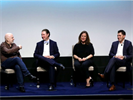Aarti Shah 11 Mar 2013 // 12:00AM GMT
AUSTIN, TEXAS — Online influencers don’t hold enough sway to warrant campaigns being built around their ability to bring followers to action, according to “The Secret Dangers of Online Influence Marketing” panel at SXSW.
All four panelists gathered at the Four Seasons in Austin agreed that influencer measurement tools, like Klout or PeerIndex, mislead marketers into replicating celebrity endorsement models that don’t work with online influencers, who are popular but not always looked to for advocacy.
“We are looking at the old model of influence,” said Debra Kaye, CEO of Lucule Consulting. “People follow and do what celebrities do, but [online influencers] are not celebrities, they are ‘normal’ people.” For instance, an online influencers tweeting their preference for Coca-Cola is unlikely to result in a sales spike, but their building a chair made of beverage bottles will probably go viral.
Ekaterina Walter, senior social media strategist at Intel, cited research showing that 80 to 90 percent of word-of-mouth happens offline, yet marketers get distracted by influencer measurement tools that result in resources being allocated to individuals who ultimately may not be interested in the brand enough to drive action.
Yet, the traditional influencer outreach model allows brands to engage in social communities at scale since a handful of influencers can cultivate engagement with masses. But the next iteration of social communities will be figuring out how brands can tap into the power of contextual relationships -- rather than influencers -- without reverting to canned responses or mass marketing, forecasted Matt Hixson, CEO of Tellagence, a tool that predicts how information will move across social networks.
“We have left the mass communications age and are going back to the personal communications age,” Kaye added. The car, once an embodiment of the American values of freedom and discovery, has been supplanted with smartphones. Brands, she argued, have yet to take full advantage of this dynamic. For instance, she said, viewers who have their smartphones with them while watching TV will visit the website of a company with a memorable commercial.
“Yet, the brands aren’t engaging on their website when their ads runs -- the websites remain static,” she said.
Jure Klepic, social media strategist at Lucule Consulting, presented results from a study the firm conducted showing blog posts are more influential than tweets and in “high influence” individuals don’t generate more results than those further down the chain.


































.jpg)






.tmb-135x100.png)










